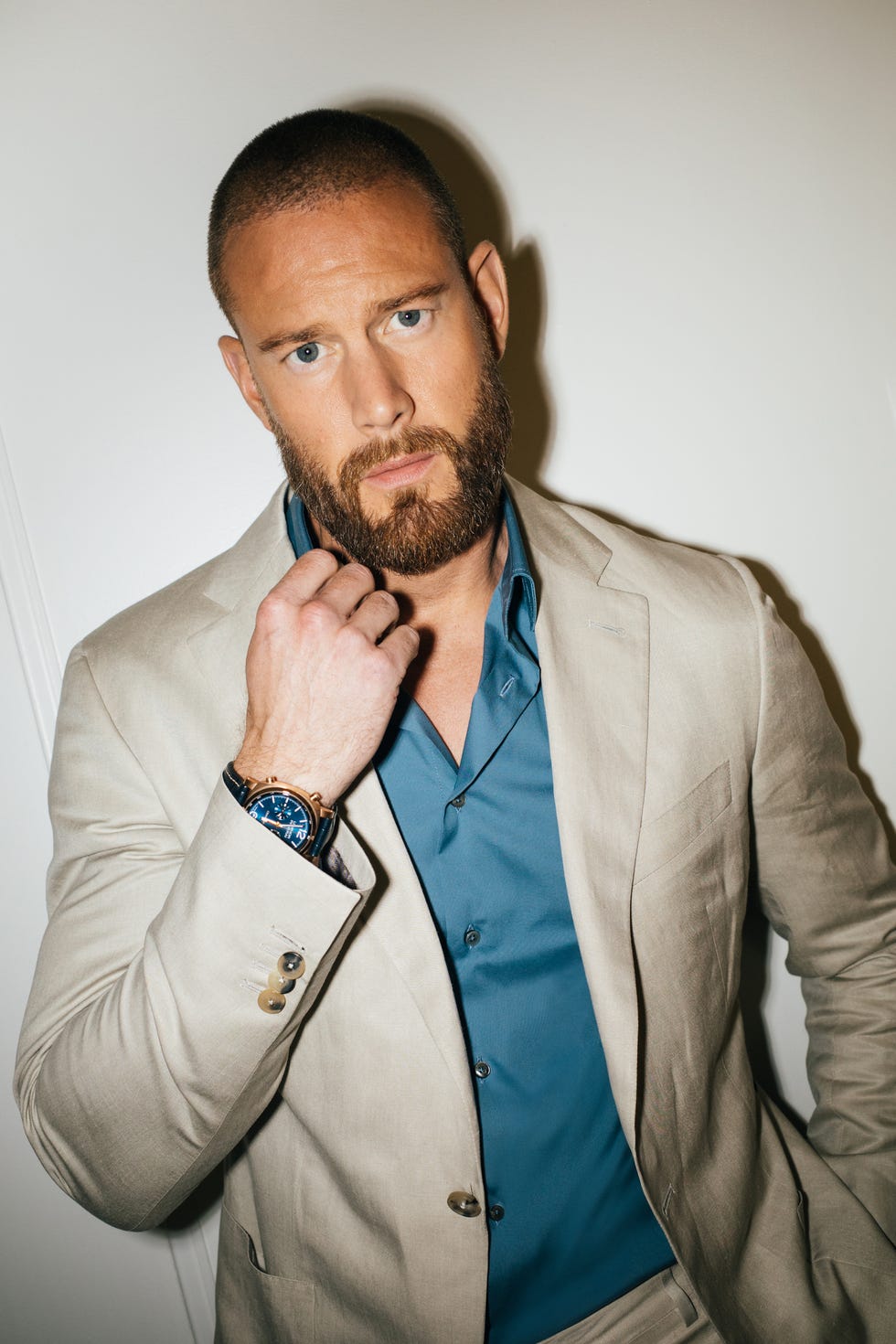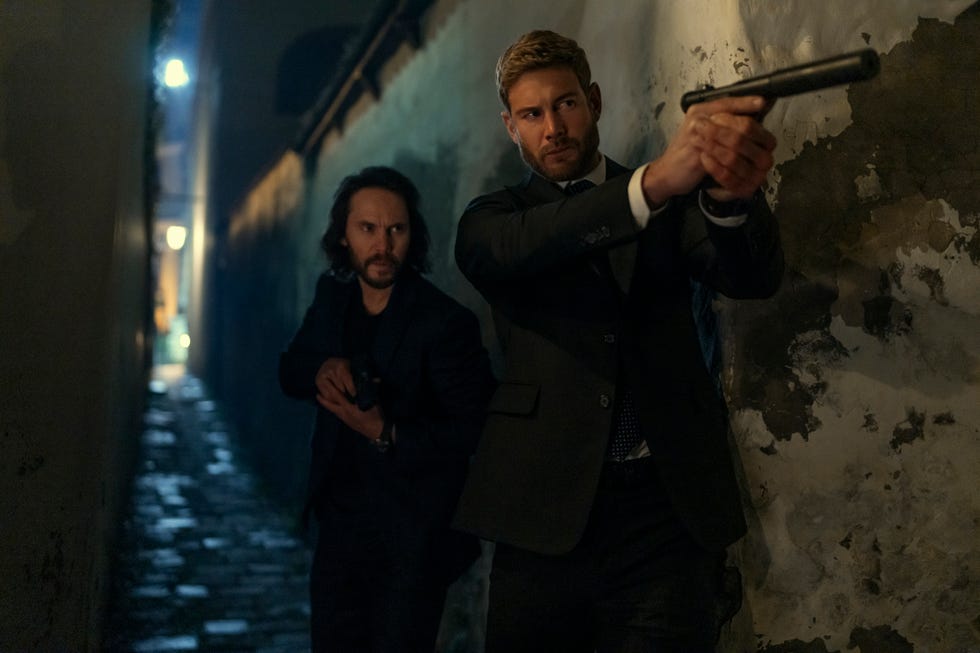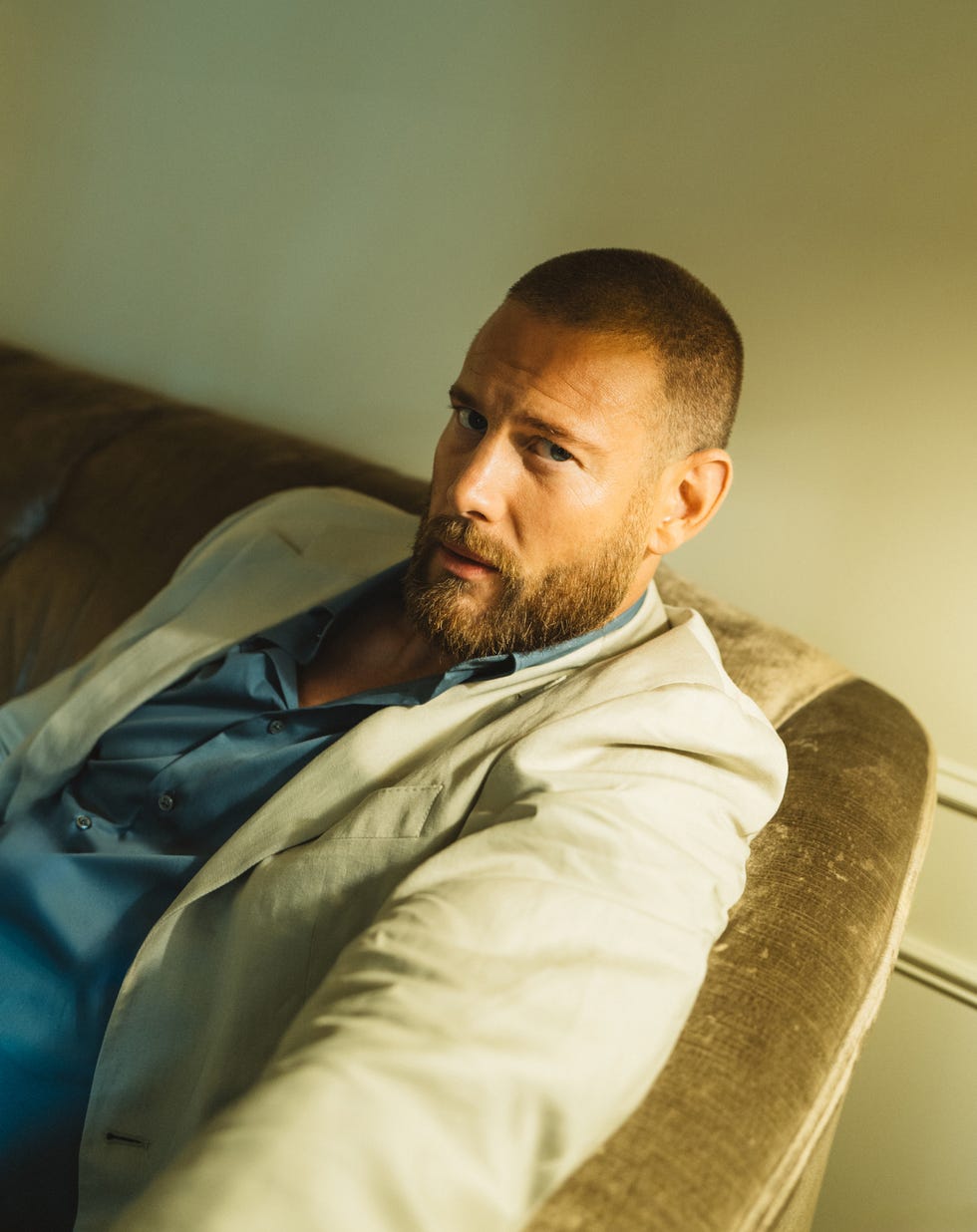Tom Hopper on <em>The Terminal List: Dark Wolf</em>, Fatherhood, and Bonding with Taylor Kitsch

Tom Hopper remembers the moment he felt his role in The Terminal List: Dark Wolf was written in the stars. While reading True Believer, published in 2019 as the second book in the Terminal List series by author Jack Carr (whose former life as a U.S. Navy SEAL profoundly informs his espionage thrillers), a certain moment gave Hopper pause. Two characters, Freddie and Reece, had an interaction that hit home for the 40-year-old British actor.
"My son, Freddie, is autistic nonverbal," Hopper tells me at a midtown hotel in Manhattan. "Jack told me that his son, Reece, has special needs. So both of them are limited in their communication."
It's one thing for Hopper to find a fictional character who bears the name of his son. But as he kept reading, he was taken by the depths of happenstance. "In the book, they are talking about Freddie's son, who has the same condition that Jack's son Reece has," he explains. "What I found amazing is that Freddie and Reece are talking to each other. Our sons can't have conversations in that manner, but through the book, our 'sons' are having these conversations. I believe in signs. I felt like this was meant to be."
With Hopper's time on the Netflix series The Umbrella Academy as the musclebound superhero Luther (which required Hopper to wear a bodysuit now finished, the actor trades superpowers for black ops tactics as one of the main stars in The Terminal List: Dark Wolf, now streaming on Prime Video.
A prequel to the 2022 series The Terminal List starring Chris Pratt, Dark Wolf tells the origin story of Terminal List's Ben Edwards, the disgraced Navy SEAL turned shadowy CIA operative played by Taylor Kitsch. For Dark Wolf, Kitsch returns as Edwards to reveal how his character joined the CIA and what led to his eventual betrayal of Pratt's protagonist James Reece in the former series. Hopper co-stars as Lieutenant Raife Hastings, a fellow SEAL who accompanies Ben in his slow march to the dark side.
"He's a loyal friend and would do anything for his brotherhood," Hopper explains of Raife's emotional psychology. "When Ben gets discharged from the SEALs and has his wings taken from him, Raife chooses to go instead of Reece. He makes Reece a promise. Keep an eye out on our boy. That sits with Raife. He feels a responsibility to do that, for Reece and for Ben as well. But he's aware that Ben has a darker side to him."
During the rest of our conversation, Hopper unloads on his own origin story as an actor, the magnitude of fatherhood, and how much The Terminal List: Dark Wolf explores the limits of bonds forged in fire.
This interview has been edited and condensed for clarity.

"He welcomed me with open arms into this franchise," Hopper says of his relationship with Jack Carr, author of The Terminal List book series. "It was an honor for me, being a fan of his books, to take on this character."
ESQUIRE: Now that you've finished The Umbrella Academy, how does it feel to act in your own body again?
TOM HOPPER: [Laughs.] I adored The Umbrella Academy. It will live rent-free in my memories forever. I gained what I consider members of my family. But I will not miss having to put on a big muscle suit every day. There's something quite nice about going onto Terminal List and being just in trousers and a t-shirt. It feels comfortable and relaxing. But what was good about that muscle suit was that it put me into that awkward physicality that Luther sat in.
Fans are meeting Raife for the first time in The Terminal List: Dark Wolf. Who is Raife from your own point of view?
I was fortunate to come across one of Jack Carr's books, Savage Son, before this crossed my desk as a TV show. Raife Hastings is a big part of that book, and I love that book. From a fan standpoint, Raife is one of Reece's oldest friends. They trained as rugby players at the same university and hunted together in Montana and Mozambique. He would do anything for Reece. They call each other blood brothers.
In Dark Wolf, when Ben has his wings taken from him, he says, "If you look closely enough, you'll see those strings vibrating inside of Ben." It's not just about fighting the enemy. There's a part of him fighting himself. What we see through Dark Wolf is how Raife has to tackle his own moral compass and stay with Ben. It comes to a point where he starts to question whether he's even able to do that anymore. He can't break his own ethics and morals for the sake of a mission that isn't his. It's not his fight.
One of the show's most important scenes is where Ben and Raife are dishonorably discharged. Tell me about the emotions you felt as Raife during the filming of that scene.
It's the disgrace of it. You've worked your entire life to be that—what these guys go through to become a SEAL—and then to not get a real honored retirement, I can only imagine is the most heartbreaking feeling. That's what's so interesting: If another SEAL was responsible for you losing your wings, standing by their side and staying with them, that's the true test of brotherhood. Because no matter what, you stand by your man. If you're not part of the military community, you might be like, Oh, [Raife] was gonna retire anyway. But to go out in that way, after the career Raife's had, is sickening. That means so much. So it's a testament to their friendship and their brotherhood that they stick together and go into this CIA world—these dark arts of black ops.
There's this thing when you start acting with another person, you gotta act like you've known each other for years but you only met last week.
In The Terminal List, Ben functions as Reece's best friend who eventually turns on him. In Dark Wolf, Raife is the best friend. In what ways do you think your role in Dark Wolf foreshadows what Ben is going to do later?
Reece is such good friends with Ben that he wants to see the good in him, and he wants to see that he would never do what he ends up doing. Reece believes in brotherhood so strongly. But in the second episode of Dark Wolf, Raife is effectively warning Reece what Ben is capable of. He's seen what is inside him. Even though Raife agrees to go protect him, he knows that's probably coming somewhere in his future, but he'll do everything within his power to stop that.
Raife believes that when someone, a soldier or warrior, has that side of them and they're fighting something deeper than the enemy, nothing's gonna stop that fire. So he's in an interesting place in the Reece-Ben relationship. Raife would feel extreme guilt that he's not there to stop that from happening.
What was the training for this show like?
[Technical advisor] Jared Shaw had spoken before about how much muscle they wanted me to have. Luckily that was the side of things I can control—how to train and eat to get my body where it needs to be. But the technical aspects, that needed teaching. Jared was amazing. Him and Ray [Mendoza], when I first got there, every day I was going in drilling. What you're doing when you're relaxed with your gun versus on a mission. How you walk, your situational awareness, how to clear rooms, how to actually operate the weapons so that it was second nature to us, muzzle awareness. I'll forever be thankful to Jared and Ray.
Does all that training influence how you behave now in everyday life?
Yeah, because you're constantly reminded of it. My situational awareness, especially when I'm walking alone at night or if I'm with my kids, there's things I'm hyperaware of now. Especially in talking to Navy SEALs, about their experiences and what can happen in a split second. It becomes part of you. You start looking around, checking exits, sitting in certain directions in a restaurant. When someone walks in, you clock them. All of a sudden I'm like, I just clocked the door. What am I doing? It certainly eats into your everyday life.

Tom Hopper (right) stars in Terminal List: Dark Wolf as Lieutenant Raife Hastings.
Have you met or spoken with Jack Carr?
He welcomed me with open arms into this franchise. It was an honor for me, being a fan of his books, to take on this character. The first conversation I had with Jack was over email. We met briefly when we did the table reads. But when we emailed, he was a generous guy off the bat. I said to him, "I do not take this responsibility lightly." We had many a conversation after that. We talked nonstop about the world, who he saw Raife as, who I saw Raife as. Every time I speak to him, it's a joy. It makes me want to do the best job I can do, because he deserves it, and his family deserves it.
I know Jack is particular about the gear his characters use. Have you spoken to Jack about the stuff Raife uses, like his guns and watches?
Absolutely. I've got email chains with Jack about different bits of kit. It was very important for me that we get Raife Courteney boots, because he wears Courteney boots exclusively. Any time you see me in the show, Raife will be in Courteney boots, which is an African brand that is quite specific to what a lot of guys out there wear when they're hunting. There's certain knives we use. There is a pistol, a 1911, which is the gun Raife is famous for using. We weren't able to get one in Dark Wolf, but in [the book] True Believer, I have a 1911.
He was very specific about the Panerai watch that he would wear. That was the watch Jack was like, "It has to be this one." Because Raife is from money. He comes from a wealthy family in Montana. So he's grown up out of wealth and he knows how to dress. He wears expensive clothes. Certainly more so than Ben.
My brother was in the military. I understand that for many soldiers, the bonds forged on the field can mean more than blood. To me, all of Terminal List feels like an exploration of the limits of soldiers' bonds. In your own view, how can brotherhood be truer than blood?
You create bonds that are as strong, if not stronger than blood sometimes. When you go through these things with these guys, I'll never truly understand what that's like. I've played competitive rugby, and you get close to your teammates because you're going through the trenches together. It's the same in marriage. Me and my wife have been through the trenches. We've gone through tough times together, and the bond we have, I'd argue, is the same as a brotherhood, because you would do anything for each other. You can take the piss out of each other, have a laugh. But ultimately, you would do anything for that person. It can absolutely become stronger than blood.
Did making this show feel like a brotherhood?
Yeah! There's this thing when you start acting with another person, you gotta act like you've known each other for years but you only met last week. There's trust you have to build. I find it important to spend time with each other off-set. Fortunately, me and Kitsch, we created this bond off-set that started day one. We built this team around us including Luke [Hemsworth] and Dar [Salim] and Shiraz [Tzarfati], some of the stunt guys, our safety officer, our A-cam operator. We all became this huge group of guys that hung out. The platoon me and Ben['s characters] are in is Charlie Platoon. We started calling this group Charlie Platoon, and it became the epicenter of the Dark Wolf crew.

"I fell in love with acting and being on stage," Hopper says of his acting origins. "I come from a sports background, and that’s what I thrive on, being part of a team."
What did you guys do together?
We'd play paddle tennis, go-karting, go out for giant meals. And naughty group chats that should never go public. [Laughs.] It's a weird, unspoken thing that happens when you bond off-camera that allows you to have that trust and care for the words that you're saying and what that means.
I understand you began acting while in school, for a production of Return to the Forbidden Planet. When did you realize you wanted to act for a living?
I played Ariel, who's on roller skates. One of the biggest things I fell in love with as an actor when I did that show was that we all worked so hard to make it amazing. When people came, we wanted them to think, This isn't a school production. This is professional. I fell in love with acting and being on stage at that point. I come from a sports background, and that's what I thrive on, being part of a team. I was like, I could do this every day.
But it never felt like an achievable goal. It never felt easy. Being a professional actor is not something you can just get the degree and work full-time. I owe a lot to my high school drama teacher, Alison Jackson... It wasn't an overnight success. That's when I owe so much to my mum. There was a point where I nearly gave in. I was like 22, 23, standing on the train to interview for an office job. I called my mum like, "I'm not sure I can do this anymore." My mum was like, "I feel like you're meant to keep on this track right now." I kept auditioning, and all of a sudden the jobs became regular and better paid. It was a steady, slow process.
On your Instagram, you don't list any of your past roles or credits. You simply have "Dad. Husband." in your bio. Why are these are your biggest roles now?
When I became a dad, we had a little scare. We didn't know if we'd lost him early on. We got a scan, and thankfully saw his little heartbeat going. I remember this overwhelming feeling of, "It's not about me. It's about this." Everything I'm doing is about them now. And it's so crazy. As a man, you have this thing of, I need to make sure they're okay. From then on, they became my mainstay. People ask me about acting, like "What role do you wanna do next? Do you want to do Marvel?" All I care about is that my career grows, to make sure they're healthy and safe. That's what it's all about. Making sure I have a happy, safe home.
My son Freddie's got special needs. My wife and I work very hard. We have a production company where we make our own movies now, and the reason we started that was because we wanted to build something bigger so that in years to come, we know Freddy is okay. One of the biggest fears of raising a child with special needs is what happens after you're gone. For me, making sure he's safe and has people around him, that's paramount. Same with my daughter, my little bubba. Making sure they're okay is everything. Nothing matters more than that.
Photography by Aysia MarottaGrooming by Michelle DemiltBarbering by Chaz Hazlitt
Styling by Michael Miller
esquire



